By
Donald H. Harrison
Aboard MV Olympic Voyager (special) -- If you're Jewish and you're
going
on a cruise, don't miss the onboard Shabbat services. They're not only
a
time for religious reflection in the midst of a new experience; they're
also a wonderful opportunity to meet fellow Jews with whom you can
compare cross-cultural observations about the places and people you've
been encountering on your vacation.
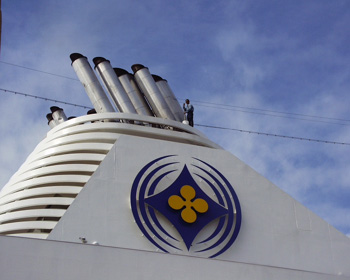 |
On a recent 17-day voyage through the Caribbean and
the Amazon, Nancy
and I had the opportunity to attend two passenger-led, Friday night
services in a lounge that doubles in the wee hours for a disco on this
sleek Greek-flag ship.
In the following days of port visits and shipboard activities, we didn't
have time to interact with all 40 people who attended the services,
but we did get to schmooze with quite a few of them. Among couples with
whom we had repeated and pleasurable interactions were |
CLEANING THE STACK -- A
deckhand is dwarfed by
the stack of the gleaming new cruise ship MV
Olympic Voyager. |
a writer and concert promoter from the Boston area; a retired school teacher
and
United Way executive from the Poconos region of Pennsylvania, and a
doctor and his wife from Toronto.
Thus Nancy and I had the uniquely satisfying feeling of being in, and
learning about, three worlds simultaneously: the Jewish world, the
Greek
world and the Third World of Latin America and the Caribbean.
The crew of the Olympic Voyager had provided candles, bread, wine and
prayer booklets for the Shabbat services, but it was up to us passengers
to find our leader. When no one volunteered the first Friday night
to
conduct the services, Nancy pushed me forward, observing that all I
really
had to do was follow the order of service set out in the pamphlet,
while
calling upon different members of our shipboard congregation to lead
the
responsive readings.
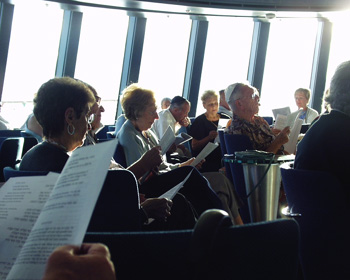 |
Struggling in my new-found role as an apprentice rabbi,
I quickly realized
that one fellow, who modestly had introduced himself simply as Stanley
from Washington D.C., knew the Hebrew prayers a lot better than the
rest
of us. Sure enough, he turned out to be retired Conservative Rabbi
Stanley
Rabinowitz from Adas Israel Synagogue. We good-naturedly "out-ed" him
from his retirement, and he graciously led the services the following
week. |
SHIPBOARD SHABBAT-- Passengers follow
along in a siddur during Shabbat services
on the MV Olympic Explorer. |
In addition to our fellow Jewish passengers, we also got to know such
Jews aboard Olympic Voyager as the Russian-born, Israeli-raised pianist
Igal Kesselman, who gave several concerts during the voyage, and
members of the ship's Israeli security detail led by Asaf Holtzman,
who is
in the period of his life between being an officer in the Israeli Army
and
attending university. We also found a touch of Israel in the spa, where
British-born Rosemary Reid offered skin treatments with muds and salts
packaged from the Dead Sea by the Ahava company. Part of the
beautician's training had been a field trip to Ahava's headquarters
in
Israel.
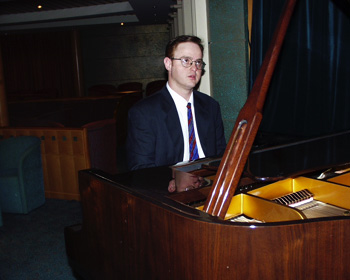 |
Fellow Jews were among several overlapping social
circles we enjoyed
while traveling on the ship. People who liked whiling away hours at
sea
competing for prizes in such games as "Trivia," "Pictionary" and
"Scrabble" were another. In "Trivia," we learned, the teams of four
which
did best were those which had mixed American and British membership,
as
many of the 20 questions posed in each game dealt with the geography,
personalities or history of the two countries. So it was that Nancy
and |
PIANIST -- Russian-born, Israeli-raised
classical pianist Igal
Kesselman--a former scholarship winner of the America-Israel
Cultural Foundaiton --practices in the Alexander the
Great
Main Lounge before a concert aboard MV Olympic Voyager. |
I got to know a pair of Englishwomen, Sue Anderson of Horn Church and
Nicola Mallard of Chester, who were among a group of singles from Britain
traveling on the cruise.
A digression about Nicola and Sue. On many cruise ships, imitation
horseracing is a highly anticipated activity, with wooden horses propelled
down a course by their jockeys according to the numbers that turn up
on a
a pair of dice. These "horses" are auctioned off, with proceeds from
the
auction forming an "owner's purse" separate from the parimutuel betting.
Awards are given to "owners" who dress their "horses" or themselves
most conspicuously. Nicola, Sue and 10 other British ladies teamed
up to
purchase one horse for, I believe, $120 or $10 per person. They named
this
mare "My Fair Lady" after the beloved musical comedy. The night of
the
big race, all the British women sported Ascot-style bonnets, and sat
demurely through "preliminary" races, barely moving a muscle in a broad
imitation of the understatedness of the British aristocracy. Upon the
start of the stakes race, however, their demeanor changed. When a die
came up with a five--the number of "My Fair Lady"--they excitedly rose
in
unison and shouted Liza Doolittle's famous line from that play: "Move
your
bloomin' arse!" Such urging evidently worked. Horse No. 5 was the
winner, netting each of the ladies about $40.
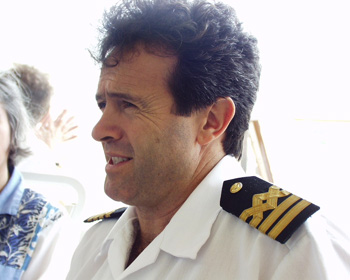 |
A third shipboard circle was a large group of San
Diegans who originally
had planned to take voyages through the Panama Canal to or from San
Diego on Olympic Voyager's sister ship, Stella Solaris. They had to
change their plans because the venerable old Stella needed to undergo
repairs in drydock. As Royal Olympic Cruise Lines was willing to give
them, in compensation for their inconvenience, upgraded accommodations
on the spanking new Olympic Voyager , many of the San Diegans happily
concluded that they had traded up. |
CAPTAIN -- Georgios Apistolas, master
of the MV
Olympic Voyater, worked his way up through cruise
line ranks, including a stint as the master of MV
Pacific Star which sailed between San Diego and
Ensenada on daily cruises in 1993. |
These and other social circles (for example, the "bridge players", "the
snorkeling and beach crowd"; "the German-speakers", and "the French-
speakers") voyaged over the course of 17 days on a round trip from
Florida
that visited, in order, Puerto Rico, British Virgin Islands, Barbados,
Brazil, French Guiana, Trinidad, Martinique and the U.S. Virgin Islands.
About 650 passengers were enveloped in the warmth of a ship that evokes
ancient Greek culture in the names of its public rooms, (for example,
the
"Alexander the Great Main Lodge"; "Ulysses Walk"; "Selenes Dining
Room"); in its many sculptures and art works; in some of its cuisine
choices, in the teaching of Greek dancing and basic Greek vocabulary
(kali
mira ; kali nikta -- "good morning; good night"), in bazouki playing
and in
the crew's energetic dance presentations.
Poems by C.P. Kavafis and Yannis Papadopoulos engraved on the landings
of
Olympic Voyager's main staircases urged passengers to be open to new
experiences, to once again taste the world with the enthusiasm of youth.
I
was struck in particular by one stanza from Ithaka, a work completed
by
Kavalis in 1911:
When you start your journey to Ithaka
Then pray that the road is long,
Full of adventure, full of knowledge
Do not fear the Lestrygonians
And the Cyclopes and the angry Poseidon.
You will never meet such as these on your path,
If your thoughts remain lofty, if a fine
Emotion touches your body and your spirit.
You will never meet the Lestrygonians,
The Cyclopes and the fierce Poseidon,
If you do not carry them within your soul,
If your soul does not raise them up before you.
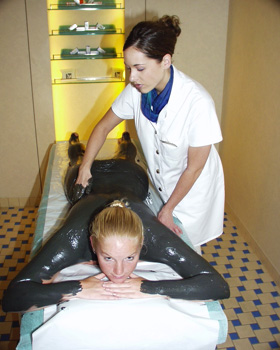 |
Lestrygonians were the cannibals that Odysseus encountered
in Homer's
classical work, the Odyssey. We passengers were pretty certain that
we
wouldn't meet anyone like them on this voyage, nor like the fierce
one-
eyed Cyclopes monster. But about Poseidon, there were certain rumors
that this ancient Greek god of the sea had not yet retired to the mythology
books; that he continued to make his presence known whenever ships
laden
with unsuspecting passengers crossed the Equator.
I tracked down the rumors to their source, that is, to Cruise Director
Elizabeth Rafferty and her affable and multilingual young men and women
of the cruise staff. On the day we passed from the Northern Hemisphere
into the Southern Hemisphere, Rafferty and company donned the robes
of |
MASSAGE -- Beautician Rosemary Reid
applies
mud from the Dead Sea duiring a massage
treatment aboard MV Olympic Voyater. Ahava
products of Israel are featured in the Greek-flag
ship's spa. |
ancient Greeks and assembled near the swimming pool on Olympic Voyager's
fantail. A deep-throated voice came over the ship's
loudspeaker, demanding to know why mere mortals such as we had dared
to disturb the great saltwater domain.
Passengers who never before had crossed the Equator were summoned to
a
trial, not by fire, but by food substances -- the kind with which the
child
in all of us likes to play patchke, patchke. With their heads covered
with
whipped cream and newly cracked eggs and their bodies doused with food
coloring, passengers were challenged to kiss a fish, or wear an octopus
(rubber) on their heads, and, perhaps more traumatic still, have their
photographs taken, before they could rinse off in the pool.
It was great fun of course. Good-natured Fred Isaac, an Egyptian-born
resident of Michigan with a striking physical resemblance to Henry
Kissinger, was one of the first to volunteer for the initiation, and
he and
onlookers smiled broadly throughout his "ordeal."
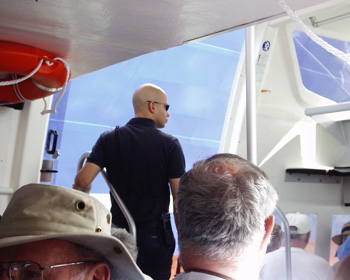 |
To a large degree, people who take cruises of 17
days, or longer, are
people who have taken shorter cruises before and liked the life style.
Many of those shorter cruises visited the Caribbean ports which were
on
the 17-day itinerary so consequently places like Puerto Rico, British
and
U.S. Virgin Islands, Barbados, Trinidad and Martinique were not so
nearly
as anticipated and speculated upon by passengers as were the Amazonian
ports of Manaus |
SECURITY GUARD -- Asaf Holtzberg, chief
of the
Israeli security detail aboard MV Olympic Voyager,
surveys the scene from a tender en route to
port call in French Guiana. |
and Santarem, Brazil, nor Devil's Island, French Guiana,
which was famed as the place of imprisonment of Alfred Dreyfus and
later
of Henri "Papillon" Charriere.
To help us prepare for the Amazonian destinations, Olympic Voyager
offered "enrichment lectures," which more than lived up to their billing,
featuring explorer and National Geographic writer and film maker Loren
McIntyre.
Captain McIntyre, as he is known, once worked his way up a tributary
of
the Amazon to its headlands in Peru, and identified the Amazon's most-
remote source, a lake which today bears his name: Lago McIntyre. If
you
want to know more about the man, just type his name on the internet.
Using the Google search engine, I found web page after web page of
sites
where he is mentioned.
Given all the kovod that is showered on such a world-famous explorer,
you might think he'd be unapproachable, but just the reverse proved
true.
McIntyre and his wife, Sue, loved conversation. You could tell by their
body language that they enjoyed answering passengers' questions not
only
about the river, its plants, its animals and its people, but also about
photography and about South America, generally.
Even more charming, the McIntyres were as curious about other people's
lives and experiences as people were about theirs. One day, McIntyre
shyly
asked me if it would be okay for him to attend the shipboard Shabbat
services. He explained that he had never been to one, and wanted to
broaden his knowledge. Of course, he and anyone else who cared to attend
were welcome; there were in fact several curious Christians who attended
our shipboard services, happily drinking the kiddush wine with us
afterwards at the oneg Shabbat.
After attending the service, McIntyre confided that when he was a youth
serving in the Merchant Marine, he had told a passenger named Livingston
of his dream to someday be a writer. Livingston, whom McIntyre
identified as a Jewish man and attorney from Chicago, encouraged him
to
observe, to write, to live -- and proved to be the mentor who had pointed
McIntyre on his career as an explorer, writer, author, photographer
and
film-maker.
After McIntrye had his first National Geographic story published, he
tried
to find Livingston, to thank him, but the Chicago phone book did not
yield
him up. McIntyre's eyes misted a bit as he told this to me and Nancy.
His
wife, Sue, smiled touchingly.
Another lecturer aboard was former U.S. Ambassador William Bodde Jr.,
a
career foreign service officer who had been posted to Europe and to
the
South Pacific.
He candidly admitted that he was a little bit out of his league talking
to
us passengers about Brazil and South America--he was like a teacher
only
a few lessons ahead of his class--but his first-hand stories about
the ups
and downs of a 40-year career in the foreign service more than made
up
for any perceived deficiencies in subject matter.
Bodde and his wife, Ingrid, also enjoyed trading stories with passengers.
After he was formally introduced to give his first lecture, Bodde told
us
that whereas "Ambassador" is a nice title, and all that, one should
never
take oneself too seriously. He said that he and other diplomats all
commiserate with U.S. Ambassador to Israel Martin Indyk concerning
an
oft-repeated., possibly apocrophyl, incident.
There was an opening of a MacDonald's in Tel Aviv--the hamburger chain's
first appearance in Israel. Everyone was given hats with the golden
arches logo for the ceremony. An Israeli boy enthusiastically asked
Indyk
if he would autograph his hat, and as the ambassador fumbled in his
pocket
for his pen, the boy said words to this effect: "How exciting it must
be for
you to be an ambassador for MacDonald's, and to appear at openings
such
as this one all over the world!"
Indyk told the boy that he was not the ambassador of MacDonald's, but
rather the ambassador of the United States of America. Did he still
want
his autograph? Indyk inquired. "Nah," said the boy, "that's okay."
Of course, one of the brightest stars in any ship's firmament is its
master. Capt Georgios Apistolas--whose first name some female
passengers insisted on spelling "Gorgeous"--beamed as he welcomed us
to
the modern navigational bridge aboard his sleek, year-old, 25,000-gross
ton vessel which can cruise at 27 knots, half again as fast as normal
cruise ships. "She leaves the pier like a bullet!" Apistolas enthused
one
day to a port pilot.
Even bullet ships have occasional problems. On our cruise, there were
some noticeable vibrations on the southward leg, a problem which repair
crews solved during our two-day stop in Manaus. Because speeds up to
then had to be reduced, and because there was trouble navigating on
the
Amazon because of free-floating logs, a short port call at Boca de
Valeria,
Brazil, had to be cancelled. As we visited nine other ports in 17 days,
passengers were not overly disappointed.
Before being entrusted with such a fine ship, Apistolas had to work
his
way through the ranks, sailing on a variety of passenger ships before
being
hired by Royal Olympic Cruise Lines, a company which resulted from
the
merger of Sun Line and Epirotiki Cruise Line. In 1993, Apistolas served
as the captain aboard Starlight Cruise Line's Pacific Star which offered
one-day cruises between San Diego and Ensenada before its parent line,
Regency Cruises, went bankrupt.
From his living quarters on the San Diego-based ship, Apistolas
remembers going to the car he kept parked on the B-Street Pier and
taking
evening rides to the Sports Arena area, where he could always find
a tool
at the Home Depot, or to see friends in Mission Valley. He has fond
memories of San Diego, especially the beautiful procession he made
each
morning from the bay to the ocean, with North Island and Coronado "on
my
port side" and Point Loma "to the starboard."
Because Olympic Voyager is so fast, he said, it can spend more time
in
ports, or visit a greater number of ports than another ship can over
a
specified period. One evening as the ship was cutting through the
Caribbean, he recalled, the sunset was so incredibly beautiful, he
couldn't
resist announcing that it could be seen on the starboard side. Then
he
remembered that many of the passengers were at first-seating dinner.
"Don't get up from your seats in the dining room," he told the passengers.
"For those of you who can't see it, I will turn the ship around, and
bring
the sunset to you."
Schedules are easy to make up on fast ships, he explained. But some
sunsets can never be reproduced. |

